Never skip your Breakfast! Breakfast is the fuel that powers your day, providing essential energy for both your body and mind to function optimally. However, the choices you make for breakfast are crucial! Check out these 15 breakfast foods to eat in morning, all supported by research to guide you toward the healthiest options.
A healthy breakfast can give you sustained energy and help you feel satisfied for a long time. An ideal breakfast foods usually contains plenty of fiber, protein, healthy fats, and essential vitamins and minerals.
Table of Contents
1. Eggs
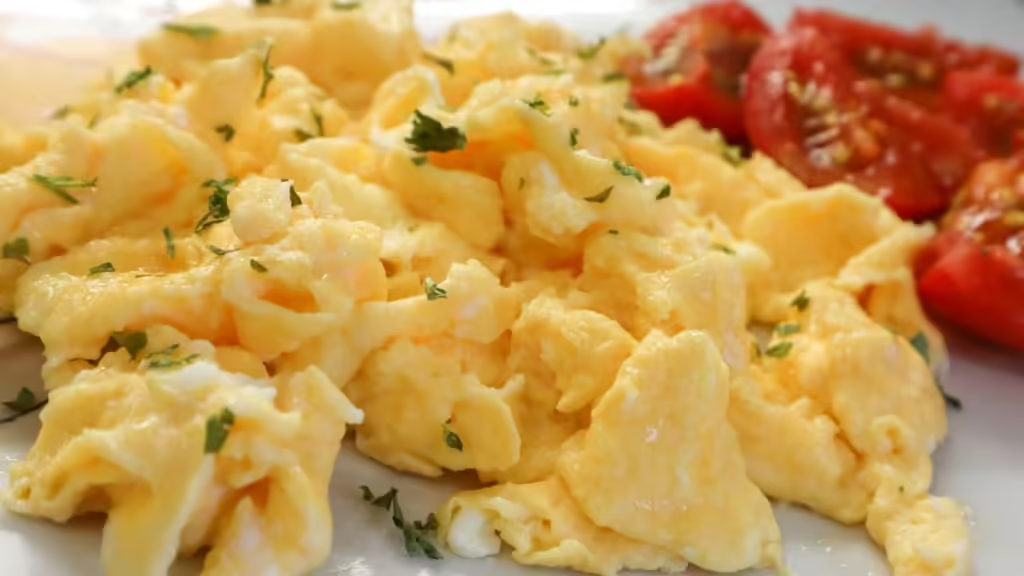
Eggs are a protein powerhouse. Studies show that eating a high-protein breakfast like eggs can keep you full longer and reduce calorie intake at your next meal. One study published in the journal Appetite found that people who had eggs for breakfast consumed fewer calories throughout the day.
Eggs boost your metabolism and especially help you shed excess fat around your belly. Yolks prevent fat absorption while providing you with iron, vitamin A and B12. egg is one of the best breakfast foods.
Scientific Benefit: Eggs contain choline, which supports brain health, and high-quality protein, keeping you satisfied longer and stabilizing blood sugar.
Nutritional Value of Egg
Here’s the nutritional value of one large egg (50g) in brief:
- Calories: 72 kcal
- Protein: 6.3 g
- Fat: 4.8 g (1.6 g saturated)
- Carbs: 0.4 g
- Cholesterol: 186 mg
- Key Nutrients: Vitamin A, B12, D, Choline, Selenium
2. Greek Yogurt
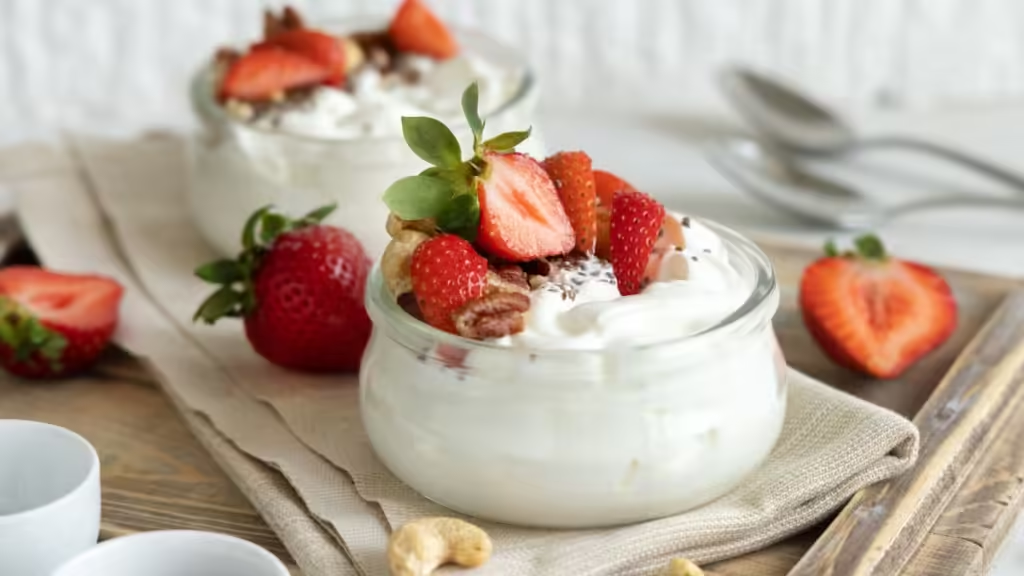
Greek yogurt is creamy, delicious, and packed with probiotics like Bifidobacteria that improve gut health. It’s also higher in protein than regular yogurt, which supports muscle health.
Conjugated linoleic acid (CLA) in it can reduce the risk of breast cancer, besides promoting fat loss. Greek yogurt is also a great source of calcium, which is essential for healthy bones.
Scientific Benefit: Research from the British Journal of Nutrition found that people who ate a high-protein yogurt for breakfast experienced increased fullness and lower hunger hormone levels throughout the day.
Nutritional Value of Greek Yogurt
Here’s the nutritional value of plain, non-fat Greek yogurt (100g) in brief:
- Calories: 59 kcal
- Protein: 10 g
- Fat: 0.4 g
- Carbs: 3.6 g
- Sugar: 3.2 g
- Key Nutrients: Calcium (10% DV), Vitamin B12, Probiotics
3. Oatmeal
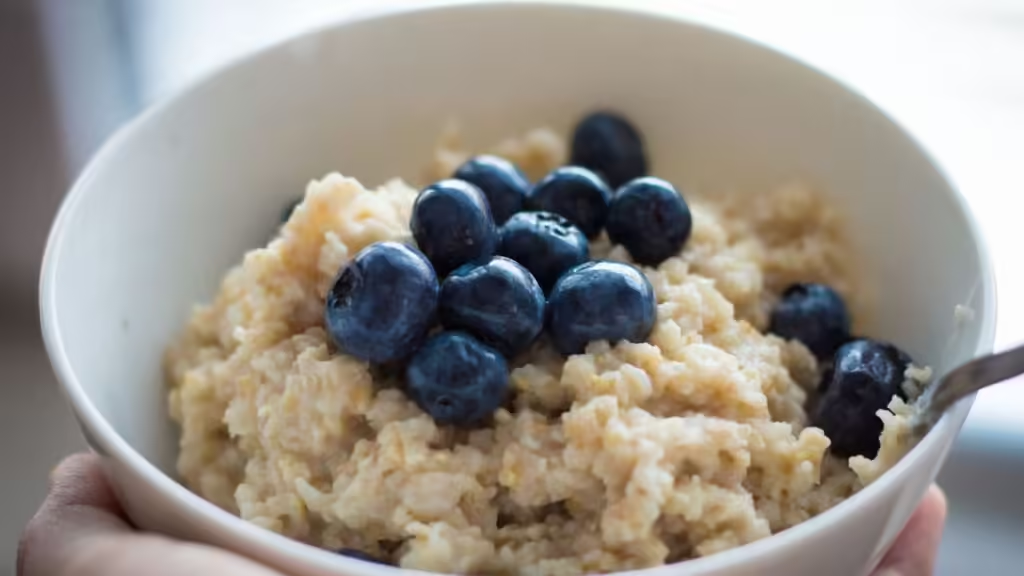
Oatmeal is rich in beta-glucan, a soluble fiber that can help reduce cholesterol levels. It’s also an ideal food for steady energy release, making it perfect for mornings.
Oats are packed with antioxidants that help lower the risk of high blood pressure and promote heart health. They also play a supportive role for the cells in your circulatory system. Plus, oats are a fantastic choice for a balanced breakfast, as they pair well with other nutritious morning foods.
Scientific Benefit: Studies from Nutrition Research have shown that oatmeal helps stabilize blood sugar, reducing spikes and crashes that lead to cravings.
Nutritional Value of cooked oatmeal
Here’s the nutritional value of cooked oatmeal (1 cup, ~240g) in brief:
- Calories: 154 kcal
- Protein: 6 g
- Fat: 3.2 g
- Carbs: 27 g
- Fiber: 4 g
- Sugar: 1 g
- Key Nutrients: Manganese (63% DV), Phosphorus, Magnesium, Iron
4. Berries
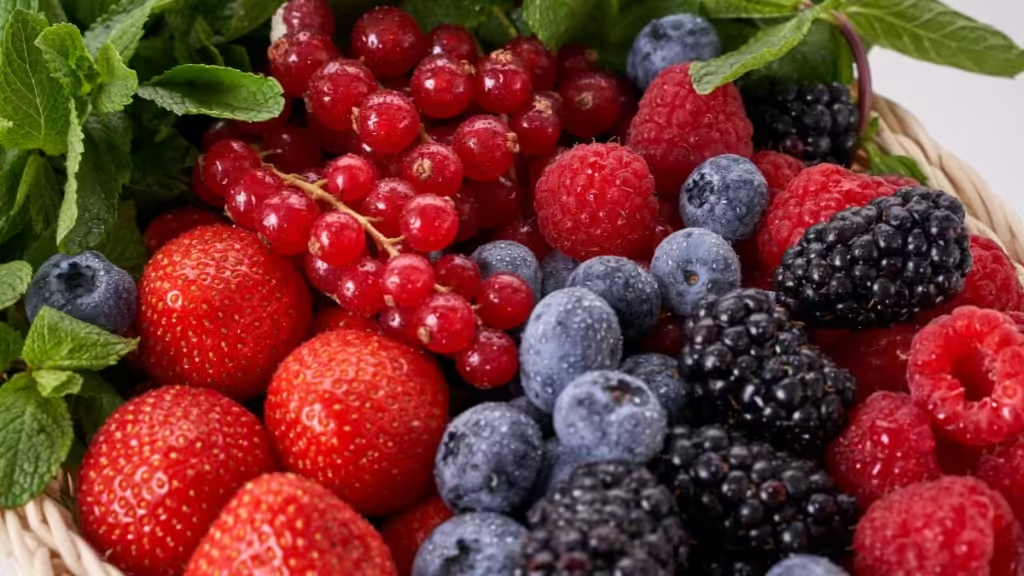
Berries like blueberries, strawberries, and raspberries are high in antioxidants and low in calories, making them a great way to sweeten up breakfast without added sugar.
Berries are not only tasty but also packed with antioxidants and have lower sugar content than many other fruits. They are high in fiber and help to alleviate inflammation.
Scientific Benefit: Research in The Journal of Nutrition found that consuming berries daily can improve heart health and may reduce the risk of cognitive decline.
Nutritional value of Mixed Berries
Here’s the nutritional value of mixed berries (1 cup, ~150g) in brief:
- Calories: 70 kcal
- Protein: 1 g
- Fat: 0.3 g
- Carbs: 17 g
- Fiber: 7 g
- Sugar: 10 g
- Key Nutrients: Vitamin C (50% DV), Manganese, Antioxidants
5. Bananas
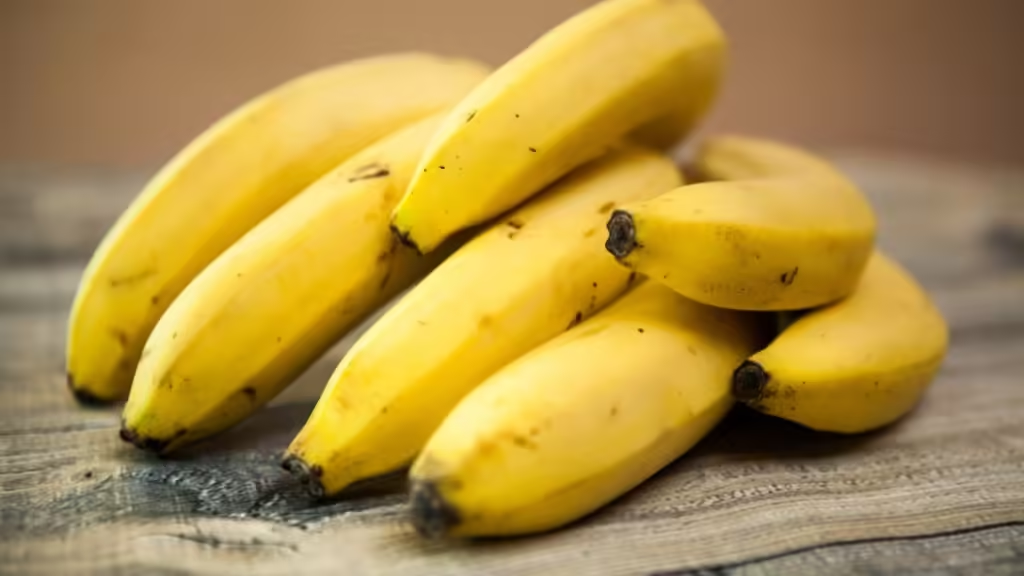
Bananas are convenient and packed with potassium, an electrolyte that helps maintain healthy blood pressure levels. They’re also high in natural sugars, which, when paired with fiber, provide a quick energy boost. They provide an excellent supply of vitamin C, vitamin B6, and dietary fiber.
Scientific Benefit: A study published in The American Journal of Clinical Nutrition showed that potassium-rich foods like bananas help reduce the risk of stroke and support heart health.
Nutritional value of Banana
Here’s the nutritional value of one medium banana (~118g):
- Calories: 105 kcal
- Protein: 1.3 g
- Fat: 0.3 g
- Carbs: 27 g
- Fiber: 3.1 g
- Sugar: 14.4 g
- Key Nutrients: Vitamin B6 (22% DV), Vitamin C (17% DV), Potassium (9% DV), Magnesium
6. Whole Grain Toast
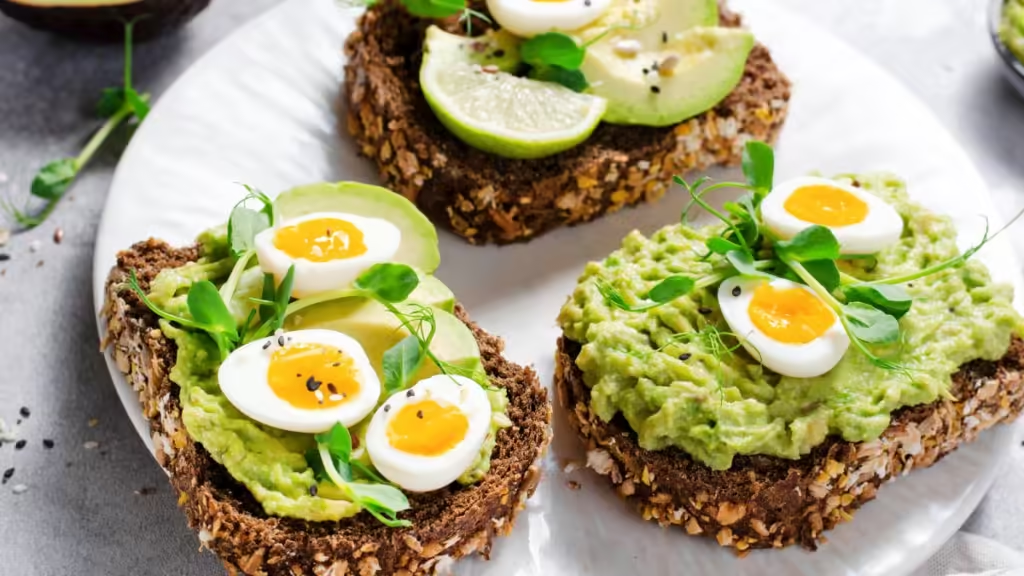
Whole grains are a great source of fiber and complex carbohydrates, offering slow-releasing energy without spiking blood sugar.
Scientific Benefit: Research from Diabetes Care showed that whole grains reduce the risk of type 2 diabetes and improve digestive health by supporting a healthy gut microbiome.
Nutritional value of Whole-GrainToast
Here’s the nutritional value of one slice of whole-grain toast (~38g):
- Calories: 80–100 kcal
- Protein: 3–5 g
- Fat: 1–2 g
- Carbs: 14–20 g
- Fiber: 2–3 g
- Sugar: 1–2 g
- Key Nutrients: Iron, Magnesium, B Vitamins (e.g., B1, B3), Selenium
7. Avocado
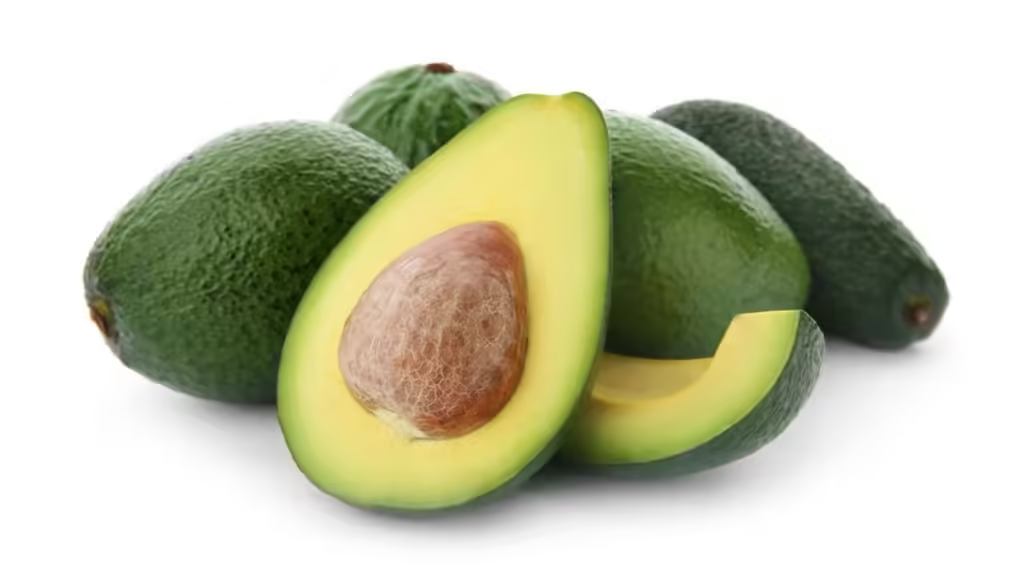
Avocados are rich in healthy monounsaturated fats, which can keep you feeling full and help improve heart health.
Scientific Benefit: A study in The Journal of the American Heart Association found that eating avocado daily can reduce bad (LDL) cholesterol levels and improve cardiovascular health.
Nutritional Value of Avocado
Here’s the nutritional value of half an avocado (~100g):
- Calories: 160 kcal
- Protein: 2 g
- Fat: 15 g
- Saturated Fat: 2.1 g
- Monounsaturated Fat: 10 g
- Polyunsaturated Fat: 1.8 g
- Carbs: 8.5 g
- Fiber: 6.7 g
- Sugar: 0.7 g
- Key Nutrients: Vitamin K (26% DV), Folate (20% DV), Vitamin E, Potassium (14% DV), Vitamin C
8. Chia Seeds
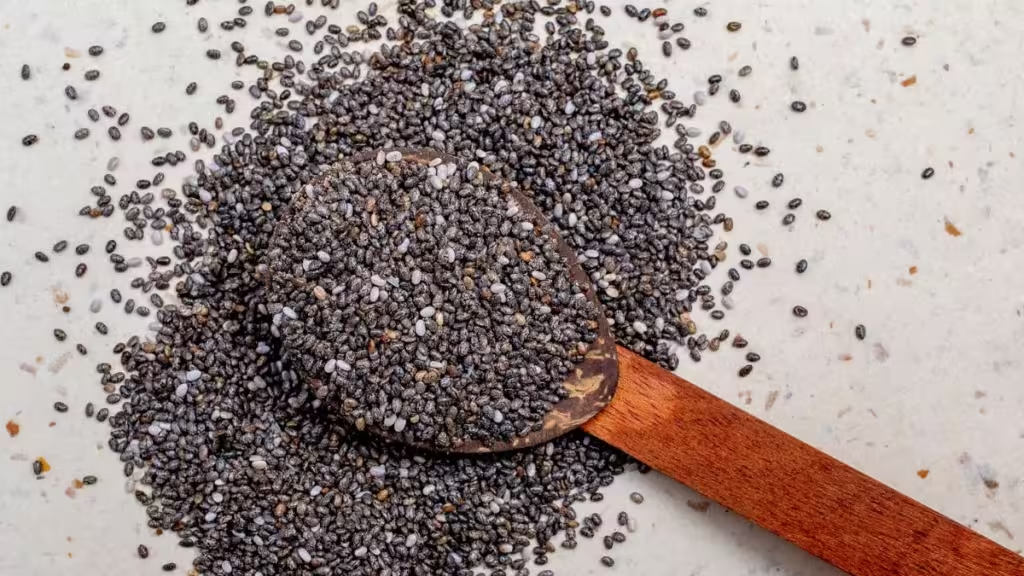
Chia seeds are a superfood fully packed with fiber, protein, and omega-3 fatty acids. They can absorb water to form a gel-like consistency, making them perfect for a filling breakfast pudding.
Scientific Benefit: According to research in Nutrients, chia seeds support weight management by promoting fullness and may improve blood sugar control in people with diabetes.
Consuming them can also help lower inflammation, and the abundant antioxidants they provide assist in safeguarding your body’s cells from free radicals generated during metabolism.
Nutritional Value of Chia seeds
Here’s the nutritional value of 1 tablespoon of chia seeds (12g):
- Calories: 58 kcal
- Protein: 2 g
- Fat: 4 g
- Omega-3 Fatty Acids: 2.5 g
- Carbs: 5 g
- Fiber: 4 g
- Sugar: 0 g
- Key Nutrients: Calcium (6% DV), Magnesium, Phosphorus, Manganese (30% DV)
9. Cottage Cheese
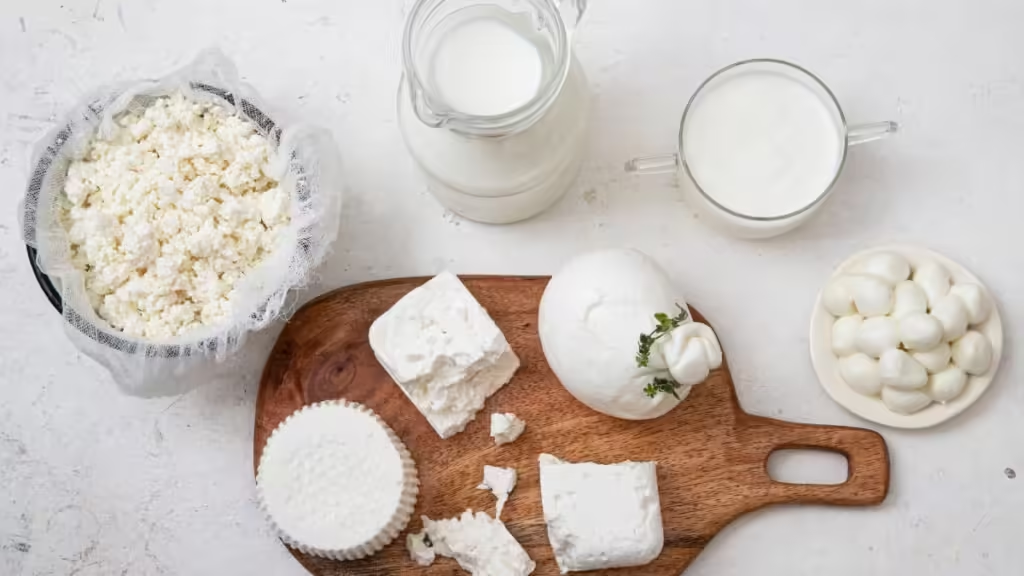
This creamy cheese is low in carbs and high in protein, making it an ideal option for a filling, balanced breakfast.
Scientific Benefit: Research in Appetite found that cottage cheese has a similar satiating effect to eggs, helping control hunger hormones and reduce calorie intake later in the day.
Nutritional value of Cottage Cheese
Here’s the nutritional value of 1/2 cup of low-fat cottage cheese (~110g):
- Calories: 90–100 kcal
- Protein: 11–12 g
- Fat: 4–5 g
- Saturated Fat: 2.5 g
- Carbs: 3–4 g
- Sugar: 3–4 g
- Key Nutrients: Calcium (10–15% DV), Phosphorus, Vitamin B12, Selenium
10. Nuts
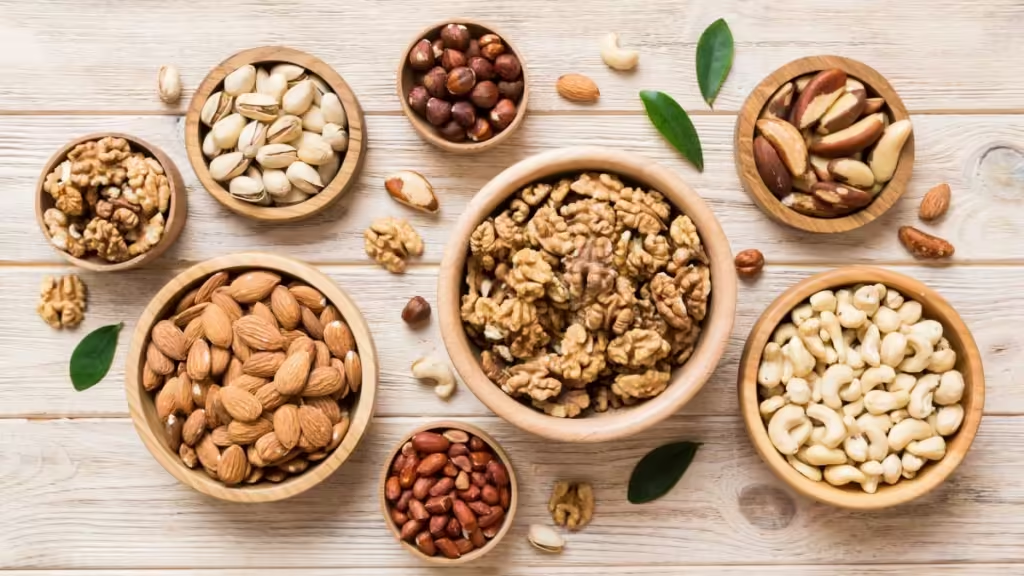
Almonds, walnuts, and other nuts are high in fiber, protein, and healthy fats, all of which can help keep you satisfied. They also support brain health thanks to their omega-3 content.
Scientific Benefit: A study in Nutrition Journal showed that eating nuts regularly can lower cholesterol, support brain function, and improve heart health.
Nutritional value of Mixed nuts
Here’s the nutritional value of a typical serving (1 oz or ~28g) of mixed nuts:
- Calories: 160–200 kcal
- Protein: 5–7 g
- Fat: 14–18 g
- Monounsaturated Fat: 7–12 g
- Polyunsaturated Fat: 3–4 g
- Saturated Fat: 1–2 g
- Carbs: 5–7 g
- Fiber: 2–3 g
- Sugar: 1–2 g
- Key Nutrients: Vitamin E, Magnesium, Potassium, Zinc, Iron
11. Green Tea

Green tea contains caffeine and L-theanine, an amino acid that improves focus. It also has antioxidants called catechins, which help protect cells.
Green tea is rich in epigallocatechin gallate (EGCG), an antioxidant that could potentially offer protection against neurological issues like dementia and prevent cell death.
Scientific Benefit: Research in American Journal of Clinical Nutrition found that the antioxidants in green tea support metabolism, increase fat burning, and provide a sustained energy boost without the jitters.
Nutritional value of Green tea
Here’s the nutritional value of 1 cup (240ml) of brewed green tea:
- Calories: 2–3 kcal
- Protein: 0 g
- Fat: 0 g
- Carbs: 0.5 g
- Sugar: 0 g
- Key Nutrients:
- Antioxidants (e.g., catechins, particularly EGCG)
- Small amounts of: Potassium, Magnesium, Vitamin C
12. Smoothies
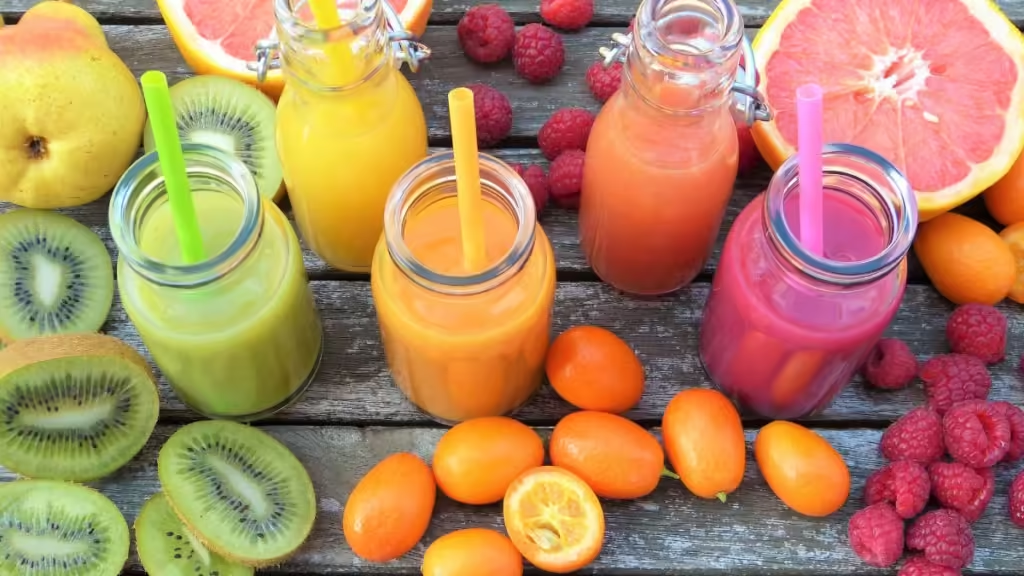
Smoothies are a convenient way to pack multiple fruits, vegetables, and proteins into a single, nutrient-dense meal. Adding greens like spinach or kale can provide additional vitamins and minerals.
Scientific Benefit: A study in Nutrition Research found that blended fruits and vegetables retain more fiber, which helps improve digestion and reduce blood sugar spikes.
13. Quinoa
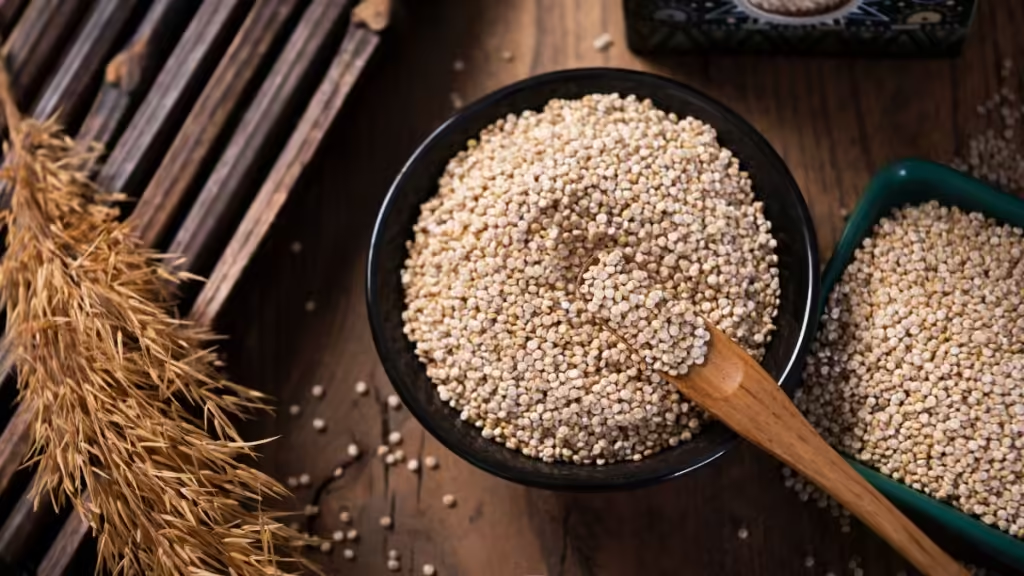
Quinoa is a gluten-free grain that’s high in protein and fiber, making it an ideal breakfast for those who prefer savory grains over sweets.
Scientific Benefit: Research published in The British Journal of Nutrition found that quinoa helps stabilize blood sugar and can lower triglycerides, supporting heart health.
Nutritional value of Quinoa
Here’s the nutritional value of 1 cup of cooked quinoa (~185g):
- Calories: 222 kcal
- Protein: 8 g
- Fat: 3.6 g
- Saturated Fat: 0.4 g
- Monounsaturated Fat: 1.6 g
- Polyunsaturated Fat: 1.4 g
- Carbs: 39 g
- Fiber: 5 g
- Sugar: 1 g
- Key Nutrients:
- Manganese (58% DV),
- Magnesium (30% DV),
- Folate (19% DV),
- Iron (15% DV),
- Phosphorus (28% DV)
14. Flaxseeds
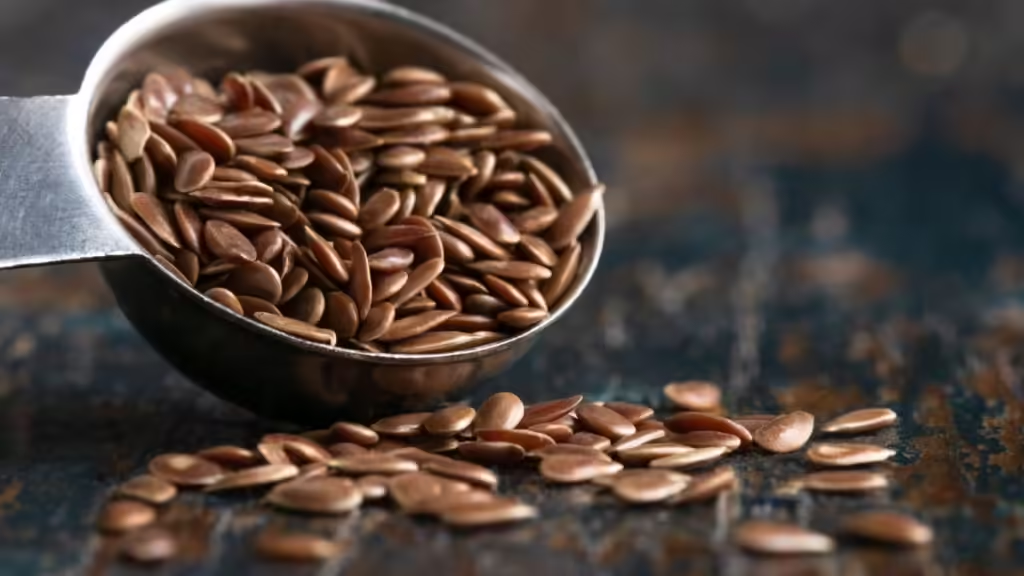
Flaxseeds are a great source of omega-3 fats and fiber. They can easily be added to oatmeal, yogurt, or smoothies for an extra nutrient boost.
Scientific Benefit: Studies in Clinical Nutrition show that flaxseeds can help reduce cholesterol and improve heart health, particularly in women.
Nutritional value of Flax seeds
Here’s the nutritional value of 1 tablespoon of flax seeds (10g):
- Calories: 55–60 kcal
- Protein: 2 g
- Fat: 4.3 g
- Omega-3 Fatty Acids (ALA): 2.3 g
- Carbs: 3 g
- Fiber: 2.8 g
- Sugar: 0 g
- Key Nutrients:
- Magnesium (8% DV),
- Phosphorus (7% DV),
- Manganese (10% DV),
- Lignans (antioxidants)
15. Cottage Cheese and Fresh Fruit
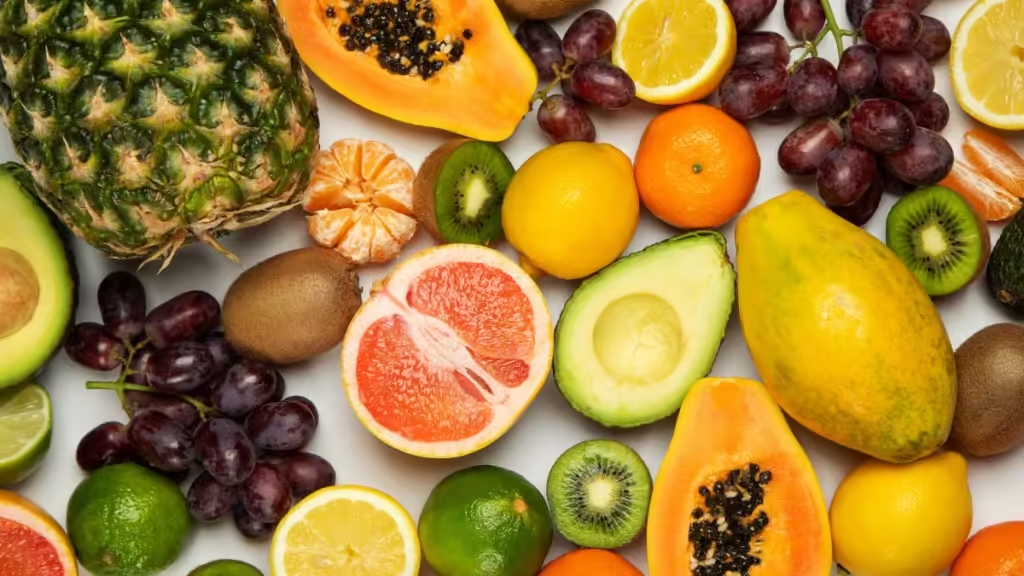
Combining cottage cheese with fruits like berries, apples, or bananas creates a balanced meal of protein, fiber, and healthy carbohydrates.
Beginning your day with some fruit in your morning meal offers numerous health advantages. Not only are fruits quite satisfying, but they are also packed with vitamins, fiber, and potassium.
Scientific Benefit: Research in Appetite has shown that combining high-protein foods like cottage cheese with fiber-rich fruits improves satiety and helps manage blood sugar more effectively.
Final Thoughts
Choosing a balanced, nutritious breakfast can set a positive tone for your day and contribute to better health in the long term. Each of these breakfast foods offers unique health benefits supported by scientific studies, helping you make informed choices to boost your energy, mental clarity, and overall well-being.
FAQs-15 Best Breakfast Foods
Why is breakfast considered the most important meal of the day?
Breakfast replenishes your body’s glucose supply after a night of fasting, helping to boost energy levels, improve focus, and provide essential nutrients. Skipping breakfast can lead to fatigue, reduced concentration, and may even increase the likelihood of overeating later in the day.
Is it okay to skip breakfast foods?
Some people do well with intermittent fasting, which may include skipping breakfast. However, research suggests that eating breakfast can improve metabolism, support mental clarity, and prevent overeating. If you feel better with breakfast, stick to it, but if you thrive on fasting, ensure your other meals are nutrient-dense.
Can I drink coffee for breakfast instead of eating?
While coffee can provide a quick energy boost, it lacks the nutrients that a complete breakfast offers. Pairing coffee with a balanced meal can help sustain energy levels and keep blood sugar stable throughout the morning.
Is oatmeal better than other breakfast cereals?
Generally, yes. Oatmeal is whole-grain and unprocessed, while many breakfast cereals are high in sugar and low in fiber. Oats also contain beta-glucan, a type of fiber that supports heart health and stabilizes blood sugar.
Sources
Nutritional values – from Chatgpt
Also Read Carbonated Water: Is it Good or Bad?

